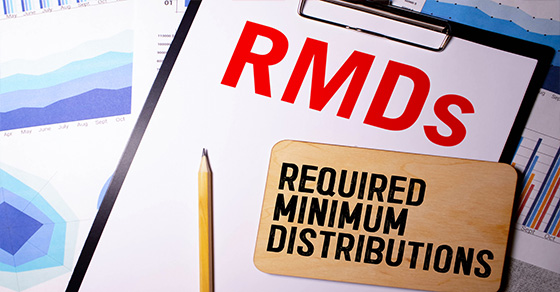If you’re a parent, you may be confused about the rules for claiming the Child Tax Credit (CTC). The rules and credit amounts have changed significantly over the last six years. This tax break became more generous in 2018 than it was under prior law — and it became even better in 2021 for eligible parents. Even though the enhancements that were available for 2021 have expired, the CTC is still valuable for parents. Here are the current rules.

For tax years 2022 and 2023, the CTC applies to taxpayers with children under the age of 17 (who meet CTC requirements to be ‘’qualifying children’’). A $500 credit for other dependents is available for dependents other than qualifying children.
Continue Reading
Many businesses in certain industries employ individuals who receive tips as part of their compensation. These businesses include restaurants, hotels and salons.

Tip Definition
Tips are optional payments that customers make to employees who perform services. They can be cash or noncash. Cash tips include those received directly from customers, electronically paid tips distributed to employees by employers and tips received from other employees under tip-sharing arrangements. Generally, workers must report cash tips to their employers. Noncash tips are items of value other than cash. They may include tickets, passes or other items that customers give employees. Workers don’t have to report noncash tips to employers.
Continue Reading
An array of tax-related limits that affect businesses are indexed annually, and due to high inflation, many have increased more than usual for 2023. Here are some that may be important to you and your business.

Social Security Tax
The amount of employees’ earnings that are subject to Social Security tax is capped for 2023 at $160,200 (up from $147,000 for 2022).
Continue Reading
Most retirement plan distributions are subject to income tax and may be subject to an additional penalty if you take an early withdrawal. What’s considered early? In general, it’s when participants take money out of a traditional IRA or other qualified retirement plan before age 59½. Such distributions are generally taxable and may be subject to a 10% penalty tax.

Note: The additional penalty tax is 25% if you take a distribution from a SIMPLE IRA in the first two years you participate in the SIMPLE IRA plan.
Continue Reading
If you’re a parent or grandparent with college-bound children, you may want to save to fund future education costs. Here are several approaches to take maximum advantage of the tax-favored ways to save that may be available to you.

Savings Bonds
Series EE U.S. savings bonds offer two tax-saving opportunities when used to finance college expenses:
- You don’t have to report the interest on the bonds for federal tax purposes until the bonds are cashed in, and
- Interest on “qualified” Series EE (and Series I) bonds may be exempt from federal tax if the bond proceeds are used for qualified college expenses.
Continue Reading
If you have a child or grandchild in college — congratulations! To help pay for the expenses, many parents and grandparents saved for years in tax-favored accounts, such as 529 plans. But there are also a number of tax breaks that you may be able to claim once your child begins attending college or post-secondary school.

Tuition Tax Credits
You can take the American Opportunity Tax Credit (AOTC) of up to $2,500 per student for the first four years of college — a 100% credit for the first $2,000 in tuition, fees, and books, and a 25% credit for the second $2,000. You can take a Lifetime Learning Credit (LLC) of up to $2,000 per family for every additional year of college or graduate school — a 20% credit for up to $10,000 in tuition and fees.
Continue Reading
If your small business has a retirement plan, and even if it doesn’t, you may see changes and benefits from a new law. The Setting Every Community Up for Retirement Enhancement 2.0 Act (SECURE 2.0) was recently signed into law. Provisions in the law will kick in over several years.

SECURE 2.0 is meant to build on the original SECURE Act, which was signed into law in 2019. Here are some provisions that may affect your business.
Continue Reading
With the 2023 filing season deadline drawing near, be aware that the deadline for businesses to file information returns for hired workers is even closer. By January 31, 2023, employers must file these forms:

Form W-2, Wage and Tax Statement. W-2 forms show the wages paid and taxes withheld for the year for each employee. They must be provided to employees and filed with the Social Security Administration (SSA). The IRS notes that “because employees’ Social Security and Medicare benefits are computed based on information on Form W-2, it’s very important to prepare Form W-2 correctly and timely.”
Continue Reading
Although the national price of gas is a bit lower than it was a year ago, the optional standard mileage rate used to calculate the deductible cost of operating an automobile for business will be going up in 2023. The IRS recently announced that the 2023 cents-per-mile rate for the business use of a car, van, pickup or panel truck is 65.5 cents. These rates apply to electric and hybrid-electric automobiles, as well as gasoline and diesel-powered vehicles.

In 2022, the business cents-per-mile rate for the second half of the year (July 1 – December 31) was 62.5 cents per mile, and for the first half of the year (January 1 – June 30), it was 58.5 cents per mile.
Continue Reading
A new law was recently signed that will help Americans save more for retirement, although many of the provisions don’t kick in for a few years. The Setting Every Community Up for Retirement Enhancement 2.0 Act (SECURE 2.0) was signed into law on December 29, 2022.

SECURE 2.0 is meant to build on the original SECURE Act of 2019, which made major changes to the required minimum distribution (RMD) rules and other retirement provisions.
Continue Reading
As you may know, you can’t keep funds in your traditional IRA indefinitely. You have to start taking withdrawals from a traditional IRA (including a SIMPLE IRA or SEP IRA) when you reach age 72.

The rules for taking required minimum distributions (RMDs) are complicated, so here are some answers to frequently asked questions.
Continue Reading
If you’re thinking about selling stock shares at a loss to offset gains that you’ve realized during 2022, it’s important to watch out for the “wash sale” rule.

The Loss Could Be Disallowed
Under this rule, if you sell stock or securities for a loss and buy substantially identical stock or securities back within the 30-day period before or after the sale date, the loss can’t be claimed for tax purposes. The rule is designed to prevent taxpayers from using the tax benefit of a loss without parting with ownership in any significant way. Note that the rule applies to a 30-day period before or after the sale date to prevent “buying the stock back” before it’s even sold. (If you participate in any dividend reinvestment plans, it’s possible the wash sale rule may be inadvertently triggered when dividends are reinvested under the plan, if you’ve separately sold some of the same stock at a loss within the 30-day period.)
Continue Reading
If you’re launching a new business venture, you’re probably wondering which form of business is most suitable. Here is a summary of the major advantages and disadvantages of doing business as a C corporation.

A C corporation allows the business to be treated and taxed as a separate entity from you as the principal owner. A properly structured corporation can protect you from the debts of the business yet enable you to control both day-to-day operations and corporate acts such as redemptions, acquisitions and even liquidations. In addition, the corporate tax rate is currently 21%, which is lower than the highest noncorporate tax rate.
Continue Reading
These days, most businesses have some intangible assets. The tax treatment of these assets can be complex.

What Makes Intangibles So Complicated?
IRS regulations require the capitalization of costs to:
- Acquire or create an intangible asset,
- Create or enhance a separate, distinct intangible asset,
- Create or enhance a “future benefit” identified in IRS guidance as capitalizable, or
- “Facilitate” the acquisition or creation of an intangible asset.
Continue Reading
The overall stock market has been down during 2022 but there have been some bright spots. As year-end approaches, consider making some moves to make the best tax use of paper losses and actual losses from your stock market investments.

Tax Rates on Sales
Individuals are subject to tax at a rate as high as 37% on short-term capital gains and ordinary income. But long-term capital gains on most investment assets receive favorable treatment. They’re taxed at rates ranging from 0% to 20% depending on your taxable income (inclusive of the gains). High-income taxpayers may pay an additional 3.8% net investment income tax.
Continue Reading
The holiday season is here and many people plan to donate to their favorite charities or give money or assets to their loved ones before the end of the year. Here are the basic tax rules involved in these transactions.

Donating to Charity
In 2022, in order to receive a charitable donation write-off, you must itemize deductions on your tax return. What if you want to give gifts of investments to your favorite charities? There are a couple of points to keep in mind.
Continue Reading
Businesses shut down for many reasons. Some of the reasons that businesses shutter their doors:
- An owner retirement,
- A lease expiration,
- Staffing shortages,
- Partner conflicts, and
- Increased supply costs.

If you’ve decided to close your business, we’re here to assist you in any way we can, including taking care of the various tax obligations that must be met.
Continue Reading
Many people have savings bonds that were purchased many years ago. Perhaps they were given to your children as gifts or maybe you bought them yourself. You may wonder how the interest you earn is taxed. And if they reach final maturity, what action do you need to take to ensure there’s no loss of interest or unanticipated tax consequences?

Interest Deferral
Series EE Bonds dated May 2005 and after earn a fixed rate of interest. Bonds purchased between May 1997 and April 30, 2005, earn a variable market-based rate of return.
Continue Reading
These days, most businesses buy or lease computer software to use in their operations. Or perhaps your business develops computer software to use in your products or services or sells or leases software to others. In any of these situations, you should be aware of the complex rules that determine the tax treatment of the expenses of buying, leasing or developing computer software.

Software You Buy
Some software costs are deemed to be costs of “purchased” software, meaning it’s either:
- Non-customized software available to the general public under a nonexclusive license, or
- Acquired from a contractor who is at economic risk should the software not perform.
Continue Reading
No one needs to remind business owners that the cost of employee health care benefits keeps going up. One way to provide some of these benefits is through an employer-sponsored Health Savings Account (HSA). For eligible individuals, an HSA offers a tax-advantaged way to set aside funds (or have their employers do so) to meet future medical needs. Here are the key tax benefits:
- Contributions that participants make to an HSA are deductible, within limits.
- Contributions that employers make aren’t taxed to participants.
- Earnings on the funds in an HSA aren’t taxed, so the money can accumulate tax-free year after year.
- Distributions from HSAs to cover qualified medical expenses aren’t taxed.
- Employers don’t have to pay payroll taxes on HSA contributions made by employees through payroll deductions.

Continue Reading
Two tax benefits are available to offset the expenses of adopting a child. In 2022, adoptive parents may be able to claim a credit against their federal tax for up to $14,890 of “qualified adoption expenses” for each child. This will increase to $15,950 in 2023. That’s a dollar-for-dollar reduction of tax.

Also, adoptive parents may be able to exclude from gross income up to $14,890 in 2022 ($15,950 in 2023) of qualified expenses paid by an employer under an adoption assistance program. Both the credit and the exclusion are phased out if the parents’ income exceeds certain limits.
Continue Reading
How much can you and your employees contribute to your 401(k)s next year — or other retirement plans? In Notice 2022-55, the IRS recently announced cost-of-living adjustments that apply to the dollar limitations for pensions, as well as other qualified retirement plans for 2023. The amounts increased more than they have in recent years due to inflation.

401(k) Plans
The 2023 contribution limit for employees who participate in 401(k) plans will increase to $22,500 (up from $20,500 in 2022). This contribution amount also applies to 403(b) plans, most 457 plans and the federal government’s Thrift Savings Plan.
Continue Reading
You’ve probably heard of the “nanny tax.” But even if you don’t employ a nanny, it may apply to you. Hiring a house cleaner, gardener or other household employee (who isn’t an independent contractor) may make you liable for federal income and other taxes. You may also have state tax obligations.

If you employ a household worker, you aren’t required to withhold federal income taxes from pay. But you can choose to withhold if the worker requests it. In that case, ask the worker to fill out a Form W-4. However, you may be required to withhold Social Security and Medicare (FICA) taxes and to pay federal unemployment (FUTA) tax.
Continue Reading
Businesses can provide benefits to employees that don’t cost them much or anything at all. However, in some cases, employees may have to pay tax on the value of these benefits.

Here are examples of two types of benefits which employees generally can exclude from income:
- A no-additional-cost benefit. This involves a service provided to employees that doesn’t impose any substantial additional cost on the employer. These services often occur in industries with excess capacity. For example, a hotel might allow employees to stay in vacant rooms or a golf course may allow employees to play during slow times.
- A de minimis fringe benefit. This includes property or a service, provided infrequently by an employer to employees, with a value so small that accounting for it is unreasonable or administratively impracticable. Examples are coffee, the personal use of a copier or meals provided occasionally to employees working overtime.
Continue Reading
Are you feeling generous at year end? Taxpayers can transfer substantial amounts free of gift taxes to their children or other recipients each year through the proper use of the annual exclusion.

The exclusion amount is adjusted for inflation annually, and for 2022, the amount is $16,000.
Continue Reading
If you’re interested in investing in tax-free municipal bonds, you may wonder if they’re really free of taxes. While the investment generally provides tax-free interest on the federal (and possibly state) level, there may be tax consequences. Here’s how the rules work.

Purchasing a Bond
If you buy a tax-exempt bond for its face amount, either on the initial offering or in the market, there are no immediate tax consequences. If you buy such a bond between interest payment dates, you’ll have to pay the seller any interest accrued since the last interest payment date. This amount is treated as a capital investment and is deducted from the next interest payment as a return of capital.
Continue Reading
If you have a child or grandchild who’s going to attend college in the future, you’ve probably heard about qualified tuition programs, also known as 529 plans. These plans, named for the Internal Revenue Code section that provides for them, allow prepayment of higher education costs on a tax-favored basis.

There are two types of programs:
- Prepaid plans, which allow you to buy tuition credits or certificates at present tuition rates, even though the beneficiary (child) won’t be starting college for some time; and
- Savings plans, which depend on the investment performance of the fund(s) you place your contributions in.
Continue Reading
IRS audit rates are historically low, according to a recent Government Accountability Office (GAO) report, but that’s little consolation if your return is among those selected to be examined. Plus, the IRS recently received additional funding in the Inflation Reduction Act to improve customer service, upgrade technology and increase audits of high-income taxpayers. But with proper preparation and planning, you should fare well.

From tax years 2010 to 2019, audit rates of individual tax returns decreased for all income levels, according to the GAO. On average, the audit rate for all returns decreased from 0.9% to 0.25%. IRS officials attribute this to reduced staffing as a result of decreased funding. Businesses, large corporations and high-income individuals are more likely to be audited but, overall, all types of audits are being conducted less frequently than they were a decade ago.
Continue Reading
You and your small business are likely to incur a variety of local transportation costs each year. There are various tax implications for these expenses.

First, what is “local transportation?” It refers to travel in which you aren’t away from your tax home (the city or general area in which your main place of business is located) long enough to require sleep or rest. Different rules apply if you’re away from your tax home for significantly more than an ordinary workday and you need sleep or rest in order to do your work.
Continue Reading
Now that fall is officially here, it’s a good time to start taking steps that may lower your tax bill for this year and next.

One of the first planning steps is to ascertain whether you’ll take the standard deduction or itemize deductions for 2022. Many taxpayers won’t itemize because of the high 2022 standard deduction amounts ($25,900 for joint filers, $12,950 for singles and married couples filing separately and $19,400 for heads of household). Also, many itemized deductions have been reduced or abolished under current law.
Continue Reading































